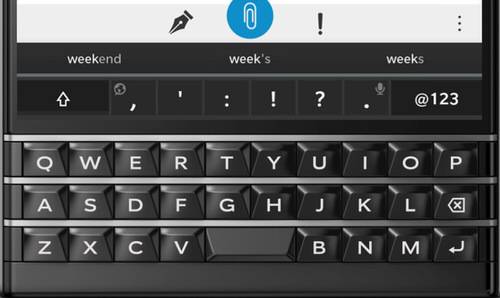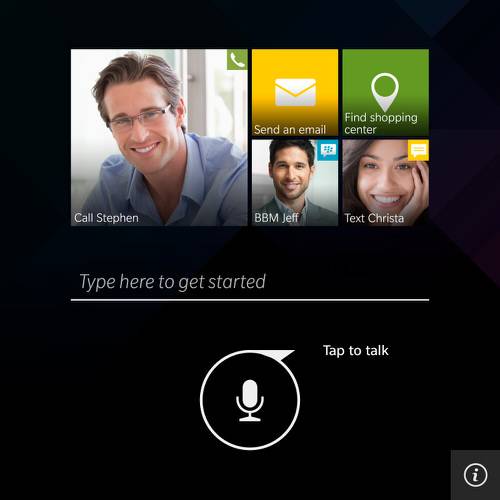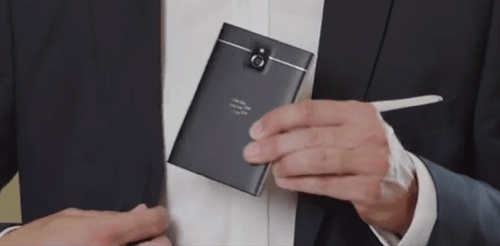BlackBerry’s claim to fame used to hang on amazing physical hardware keyboards, a rarity in today’s smartphone scene. Now the former darling of the work world wants to recapture those glory days.
Toward that end, on Wednesday it launched the new BlackBerry Passport—a squarish keyboard-equipped smartphone powered by BlackBerry 10.3, the company’s latest mobile operating system.
Consider it BlackBerry’s’s bid to recapture hearts and hands, especially those of the business users who once held it so dear. But this odd-looking device might just be a little too bizarre for the buttoned-up enterprise crowd—or anyone else, for that matter.
Desperate For A Comeback
Before Apple and Google dominated the smartphone market, BlackBerry was a major player in advanced mobile devices.
See also: Disaster Strikes BlackBerry—Huge Job Cuts, $1 Billion Net Loss
The Waterloo, Canada–based company’s keyboard phones were more than just productivity gadgets; they were trendy status symbols that suggested affluence, success and a get-down-to-business lifestyle that hinted at the user’s VIP status. Less than a decade later, BlackBerry has morphed into an underdog with dismal earnings. Despite a name change and an executive shakeup, the company struggles to maintain its fourth-place slot behind Windows Phones, itself far behind iPhones and Android devices.
One reason for the drop-off: The business world, which once basically ran on BlackBerries, started yielding to popular employee demand. Many implemented BYOD (bring-your-own-device) initiatives that allowed staffers to use personal iPhones or Android devices for work.
Now BlackBerry wants those customers back. Although the company’s future seemed to lie in enterprise-level software, it can’t seem to shake the idea that it can win by making new handsets. And now it’s hoping this phone will be its passport to success.

Workers—particularly those who miss the BlackBerry Bold and Curve from years ago (or their physical keyboards, at least)—may be curious about what this new device can offer. Well, let them wonder no longer. In a word, what it offers is … strangeness.
Passport: What A Trip
The Passport is an unconventional smartphone sized like an actual passport. It’s certainly a different approach than the phablets out there now, with a square screen that gives documents and spreadsheets plenty of room to breathe.
Of course, you’d expect a BlackBerry to nail the keyboard experience. But the wide space can’t overcome one big issue with it: The buttons sit in a disorienting three-row design, with the spacebar wedged up into the third row.
It’s a weird choice, considering that the main benefit of hardware keyboards is the fact that you can touch type on them. With this alternative design, a lot of people will errantly hammer that spacebar when they’re reaching for the “b,” “n” or “m.”
On the plus side, the physical keys have virtual partners riding shotgun. Those onscreen keys pop up onscreen and change depending on which apps you’re using. It’s also nifty that the keyboard has touch features that turn it into a touchpad of sorts, one that lets users flit along the tops of the keys for swiping or scrolling action.

The square, 1,440-pixel, 4.5-inch display may stop short of phablet proportions, but bypassing a tall rectangle for a broader, squarer shape really maximizes that real estate. Too bad that makes for a wonky phone experience. With a 3.56-inch width and a 0.36-inch thickness, that would feel like holding an extra-fat kitchen tile up to your face.
Unsurprisingly, the handset isn’t all that easy for one-handed use. Although you could make that argument about huge phablet-sized smartphones in general, many—like those from Samsung and now Apple—at least offer a one-handed mode.
It’s all just a bit bizarre—perhaps too weird and with too high a learning curve for most people to get a grip on.
This Is Not A Ticket To Relevance
Not that Passport completely ignores the competition. The device also includes a voice command tool called BlackBerry Assistant, a feature akin to Siri, Cortana or Google Now, but minus the predictive features.

It also ties into BlackBerry Blend, a syncing feature that puts messaging and other smartphone content to your Windows and Mac computers, and Apple and Android tablets.
With all that to hammer the battery, Passport still lists a respectable 30 hours of mixed use. If actual performance lives up to that long-term, that should please power-hungry users.
Unfortunately, it doesn’t eclipse one primary issue: apps. Passport runs Android apps courtesy of the Amazon Appstore. Granted, users are better off than relying solely on BlackBerry World and its slim pickings. But the options can’t compare to Google Play or Apple’s App Store. And people looking for Gmail, Calendar or other Google services will be out of luck.
See also: BlackBerry’s App Store Flooded By 47,000 Terrible Apps From One Developer
Video is another conundrum. On a square screen, streaming Netflix, Hulu, YouTube or other services will either chop off part of the action at the sides or render large black bars above and below the picture. While watching movies isn’t crucial for most business tasks, people still do a lot of it on modern smartphones, and Android, Apple and Windows Phone models manage it better.
Perhaps the most obvious question is this: With Apple’s iPhone 6 Plus “bendability” making headlines, how will a wider phone—even one with Corning’s super strong Gorilla Glass—fare in pants pockets across the land? After all, not everyone wears suit jackets, even in the business world.

Amid all that, the company’s smartest move seems to be this: It didn’t put all its BlackBerries in this basket. The company will reportedly bring another handset to market later this year—the so-called BlackBerry Classic. By all accounts, its more traditional design might be a better fit for any leftover fans of the old Bold or Curve. The company is also mulling over wearable gadgets, such as a smartwatch, eyewear or both.
The Passport may show that the company still has a pulse, but it’s no ticket back to relevance—it’s just a passage to a strange, disorienting place for smartphone users. Hopefully it’s just temporary stopover, not a destination.
The Passport is available now, starting at $599 retail (factory unlocked) on BlackBerry’s website. It’s also available on Amazon. Carriers haven’t announced two-year contract pricing, but it’s expected to go for around $250.
Screenshots by Adriana Lee for ReadWrite

















